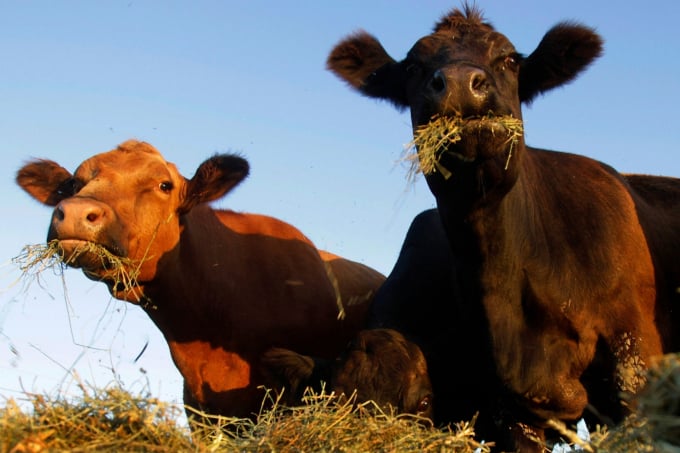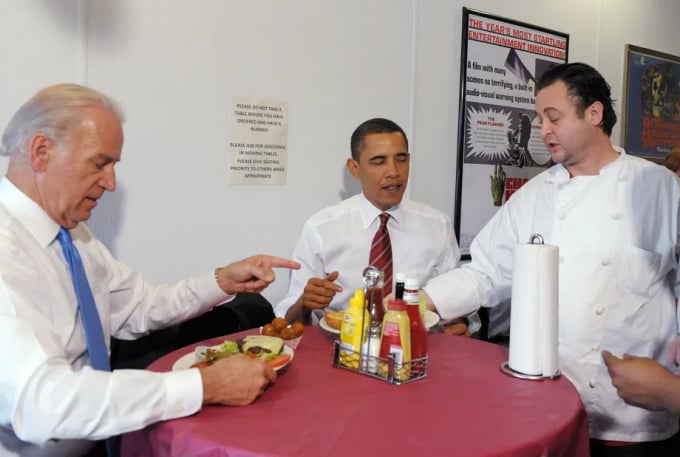May 21, 2025 | 03:48 GMT +7
May 21, 2025 | 03:48 GMT +7
Hotline: 0913.378.918
May 21, 2025 | 03:48 GMT +7
Hotline: 0913.378.918

Simmental beef cattle feed on hay in a pasture near Middletown, Ill. | Seth Perlman/AP Photo
President Joe Biden is not going to ban red meat. In fact, his administration isn’t doing much to confront the flow of harmful greenhouse gases from the very big business of animal agriculture.
The Agriculture Department’s newly published “climate-smart agriculture and forestry” outline says almost nothing about how Biden aims to curb methane emissions from livestock operations. But environmentalists argue that any effort to shrink the farm industry’s climate footprint is half-baked if it relies on voluntary efforts and doesn’t address America’s system of meat production.
“USDA is setting itself up to fail on its climate and environmental justice goals,” says Chloe Waterman, senior program manager at Friends of the Earth U.S., a nonprofit environmental advocacy group.
USDA didn’t respond to several requests for comment on this article.
The problem is that meat has become an intense culture war issue. Look no further than the manufactured outrage over the recent right-wing media attack falsely claiming that Biden wants to control each individual’s beef intake. Or look at the steady stream of press releases by farm-state lawmakers blasting any hint that federal or local governments are somehow helping “meatless Monday” campaigns.
But by the numbers, agriculture is a significant part of the climate problem: it accounts for 10 percent of all U.S. greenhouse gases. Livestock production — everything from raising pigs for bacon to dairy herds — is the largest source of potent methane emissions, according to the Environmental Protection Agency. That means addressing how we produce and consume meat is critical to Biden’s pledge to put the U.S. on track to reach net-zero agricultural emissions before any other nation.
The powerful farm lobby in Washington and state capitals opposes regulation of large-scale livestock operations and the promotion of alternatives to meat and dairy. Instead, Biden administration officials are talking up unproven technologies and feel-good sustainability goals when they discuss methods of how to tackle climate change with the agriculture industry.
Agriculture Secretary Tom Vilsack is largely focused on offering new financial incentives for farmers and ranchers to adopt more climate-friendly practices. In terms of livestock emissions, Vilsack touts innovations like feed additives that reduce the potency of an animal’s gas and feces, or digester systems that capture methane fumes from manure pits and convert them into a source of energy.
Stephanie Feldstein, population and sustainability director at the Center for Biological Diversity, a nonprofit environmental group, argues that such methods only have marginal benefits for the environment.
“There’s simply too much meat and dairy being produced right now for any of those small tweaks to get the emissions reductions that we need,” she said. “There are so many policies, from dietary guidelines to what school meals are reimbursed, to agricultural loans and government purchases, that are currently promoting overproduction of meat — and all of that needs to change.”
It’s not just Biden’s farm chief who is treading carefully on livestock emissions: John Kerry, the president’s special climate envoy, rejected the idea that the government will eventually have to tell Americans to eat less meat.
“Not necessarily, because there’s a lot of research being done now that will change both the way meat is produced, cattle are herded and fed,” Kerry said in a recent BBC interview. But he also acknowledged that Biden’s aggressive goals for slashing greenhouse gas emissions rely heavily on technology that hasn’t been developed yet.
That’s why environmental advocates are pressing for more immediate action. More than two dozen groups petitioned the EPA last month to restrict greenhouse gases from large dairy and hog farms under the Clean Air Act, specifically operations with at least 500 cows or 1,000 hogs.
Many such large operations are propped up by USDA’s guaranteed loans and other farm support programs, Ben Lillliston, director of rural strategies and climate change at the left-leaning Institute for Agriculture and Trade Policy, noted recently.
He’s urging USDA to “stop public funding for high emitting factory farms,” referring to what the industry prefers to call concentrated animal feeding operations, or CAFOs.
Since the Biden administration took over, agribusinesses and the prominent agricultural trade groups have accelerated efforts to head off federal regulators by setting their own climate goals and trumpeting steps that producers are taking to lower their environmental footprint.
“Many meat producers, packers and processors have already committed to further strengthen their contributions to healthy land, air and water,” said Eric Mittenthal, a spokesperson for the North American Meat Institute, which represents meatpackers and processors.
Other groups are throwing their weight behind the sort of voluntary efforts that Vilsack is promoting. The National Pork Producers Council has been touting the potential climate benefits of methane capture and genetically engineered pigs that better digest nutrients and effectively give off less gas. But it warned that more aggressive measures, such as curbing the growth of hog operations, would backfire.
The National Cattlemen’s Beef Association also supports voluntary initiatives along the lines of existing USDA conservation programs. Practices like rotational grazing and planting cover crops “have lately become buzzwords for policymakers in Washington,” but they’ve long been employed by farmers and ranchers, Ethan Lane, the group’s vice president of government affairs, said.

Biden and Barack Obama visit Ray’s Hell Burger in Arlington, Virginia, in 2009. Photo: Vox
“It’s important to note that a sustainable future for the cattle industry does not necessitate a total overhaul of the way producers do business,” Lane said. “The U.S. cattle and beef industry has had the lowest greenhouse gas emissions intensity in the world for 25 years. Direct emissions from cattle account for only 2 percent of the nation’s overall emissions.”
There’s also not much appetite in Congress for stricter regulations. Sens. John Thune (R-S.D.) and Kyrsten Sinema (D-Ariz.) recently filed legislation that would prohibit the government from requiring livestock emission permits.
“Livestock producers are working to improve efficiency and reduce emissions from their operations,” Thune, the second-ranked Senate Republican, said in a statement. “They should not be subject to onerous regulations and costly permit fees for their animals’ emissions, which could ultimately lead to higher food costs for consumers.”
On the other side, more progressive lawmakers are pushing for USDA to take a tougher stance on large-scale livestock production.
“For too long we’ve relied on an extractive, exploitative form of corporate agriculture, with lots of negative consequences,” House Appropriations Chair Rosa DeLauro said at a recent hearing on USDA research programs.
The Connecticut Democrat cited a new study in the Proceedings of the National Academy of Sciences that found that nearly 16,000 Americans die each year from air pollution caused by food production — primarily meat, dairy and crops used for animal feed. The findings, which industry groups dispute, suggest that shifting America’s diet more toward plant-based foods could reduce such deaths by as much as 83 percent.
Notably, DeLauro says it’s time for taxpayers to subsidize research into alternative proteins at the same rate as traditional livestock production, calling such products a “compelling option for addressing agricultural emissions.” It’s a key statement coming from the top lawmaker in charge of allocating more than a trillion dollars of annual spending.
Plant-based meats are quickly gaining in popularity, but they still account for less than 1 percent of all refrigerated meat sales.
A policy paper from the nonprofit Climate Advisers and the Good Food Institute, which advocates for alternative meats, says a “global protein transition” is needed to reach the goals in the Paris climate agreement. Speeding up the adoption of alternative meats while making the existing system more efficient could make a bigger dent in cutting global emissions than switching to electric vehicles, according to the report.
Some beef producers are seeking a middle ground.
Mike Salguero, the founder of ButcherBox, which delivers grass-fed beef and other meats directly to consumers, said the beef industry for decades has focused primarily on food safety and efficiency, rather than sustainability. But the growing focus on climate change and the wave of slaughterhouse shutdowns during the coronavirus pandemic are forcing more people to rethink the way meat is produced.
Salguero wrote a letter to Vilsack last week asking USDA to formally study ways to encourage raising cattle on pastures — a system widely seen as better for the environment — instead of sending them to massive feedlots.
There are currently too many hurdles and inefficiencies for grass-fed beef production to gain a large market share, he said. Salguero cited the lack of access to large slaughterhouses and the structure of farm financing that often forces producers to sell their cattle to a feedlot when their loans are due.
“I don’t think meat is going away,” he said. “I do think meat can be done a lot better. We’re proving there’s a market for it, and proving there’s a third way.”
(Politico)

(VAN) Attempts to bring down the price of the Japanese staple have had little effect amid a cost-of-living crisis.

(VAN) Fourth most important food crop in peril as Latin America and Caribbean suffer from slow-onset climate disaster.

(VAN) Shifting market dynamics and the noise around new legislation has propelled Trouw Nutrition’s research around early life nutrition in poultry. Today, it continues to be a key area of research.

(VAN) India is concerned about its food security and the livelihoods of its farmers if more US food imports are allowed.

(VAN) FAO's Director-General emphasises the need to work together to transform agrifood systems.

(VAN) Europe is facing its worst outbreak of foot-and-mouth since the start of the century.

(VAN) The central authorities, in early April, released a 10-year plan for rural vitalization.